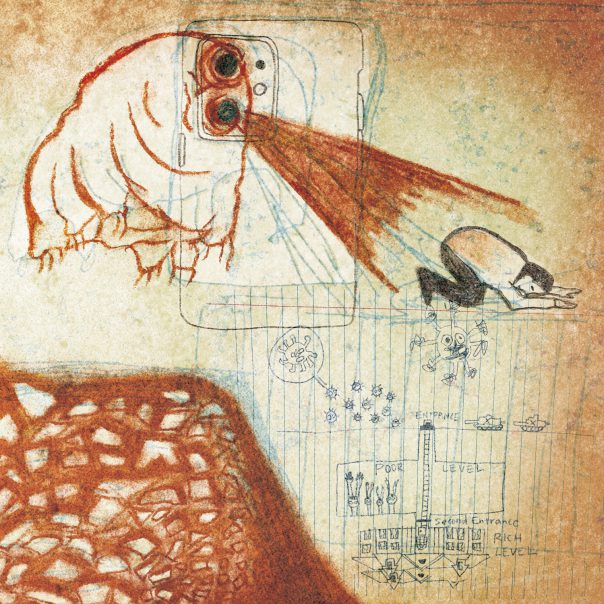ALBUM REVIEW: Deerhoof writes post-apocalyptic indie rock with ‘Future Teenage Cave Artists’

Since forming in ‘94, San Francisco’s Deerhoof has remained a bastion of rock music at its most alien and unorthodox. The indie rock building blocks are always there but looking beyond the surface reveals some seriously mind-bending stuff—even for noise rock. With that in mind, Deerhoof’s 16th album, Future Teenage Cave Artists, could not have a more fitting title. It’s quite easy to imagine the survivors of the distant future finding musical equipment in an abandoned Guitar Center after the nuclear fallout disperses, and banging out this album as an interpretation of rock music. The results maintain Deerhoof’s standard of unfiltered weirdness, underscored by memorable tunefulness.
Future Teenage Cave Artists
Deerhoof
Joyful Noise Recordings, May 29
The janky riffs, unpredictable beats and altered electronics that open the title track immediately feed garage rock through whatever Instagram filter the amorphous blob in the album artwork is using. The soothing vocal melodies from Satomi Matsuzaki might seem like a direct contrast to the controlled atonality, but balancing serenity and oddity has often been Deerhoof’s M.O. in the past.
Where the likes of Lightning Bolt and Tropical F Storm lean toward brazen unorthodoxy, this band’s approach to noisy achieves a dreamlike aura. Lopsided rhythm breaks and protracted guitar motifs notwithstanding, “The Loved One” finds Matsuzaki’s hooks still working their magic. It might take a moment to find the groove, but it’s hard to get off the train once it leaves the station, powered by vaguely dub-inspired rhythm structure and lyrical depictions of lackadaisical nihilism.
Though self-limited in its production, Deerhoof hasn’t lost its energy. The frenetic “‘Farewell’ Symphony” comes off like a weather report getting jumped by scronky noise rock, while the kaleidoscopic riffage of “Damaged Eyes Squinting into the Beautiful Overhot Sun” provides a whirlwind of simplicity and depth. In both cases, the band approaches raw, lo-fi sonics like a small chamber orchestra. Guitarists John Dieterich and Ed Rodriguez layer their rusty tones into beautiful, yet obscure progressions.
The guitar work on “Sympathy for the Baby Boo” might throw a bone to fans of Ty Segall, but even Deerhoof’s most traditional rock ideas weave in and out of rhythm changes like a drunk snake. Delving into deeper cuts reveals the band’s true disregard for convention. Good luck making heads or tails of “New Orphan Asylum for Spirited Deerchildren” on first listen.
Greg Saunier’s electro-acoustic percussion pushes and pulls the tempo on a dime, as Matsuzaki doles out her inexplicable wordplay: “Why would you shoot my Bambi’s/ What did my Bambi’s do to you?” The song’s arrangement reveals some legitimate intricacy, from its Frankenstein’s monster of rock and roll to its spacious and murky conclusion.
Deerhoof’s more free-flowing cuts show what uncharted territory can be covered by turning down the volume. “Fraction Anthem” and “Reduced Guilt” essentially combine the jazzy post-rock of Talk Talk with the weirder post-punk acts like The Pop Group. The former’s keyboard patches shine like a dust-encrusted headlight, while the drumming and bass interlock their respective tangents at all the right times.
It could be called folk-jazz, but as a distant memory—like echoes from another time. In that sense, the latter cut draws connections to Tom Waits’ later albums. Saunier’s piano arpeggios and sauntering pulse still evolve into what could be described as a soulful ballad for the post-apocalyptic Bay Area.
The avant-funk sheen of “O Ye Saddle Babes” and the Latin-tinged chaosphere of “Zazeet” displays the more explosive side of Deerhoof’s take on jazz-rock. As “Zazeet” tumbles through beat shifts and syncopated riffing, the band proves it can operate like a well-rounded clock while also sounding like it’s on the verge of total collapse. Meanwhile, “O Ye Saddle Babes” recalls Miles Davis’ electric era with Matsuzaki’s evolving bass lines and Saunier’s addictive groove and ponderous keyboards—before Dieterich’s and Rodriguez’s blaring guitar motif brings the explorations back to its roots in dirty, unrefined rock.
No one should be surprised about this album ending with a rendition of Johann Sebastian Bach’s “I Call on Thee.” It’s actually the easiest sonic pill to swallow, and the best encapsulation of the statement Deerhoof has made with Future Teenage Cave Artists. The performance paints a picture of grizzled scavengers finding the moldy sheet music next to a dilapidated piano, and resurrecting the beauty preserved on the ink. In Deerhoof’s dystopian future, this album proves there is still sublimity and euphoric racket to be found. As rock music reaches a crossroads of relevance, Deerhoof reps the avant-garde for the coming decade.
Follow editor Max Heilman at Twitter.com/madmaxx1995 and Instagram.com/maxlikessound.
